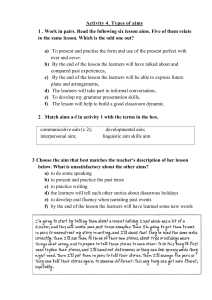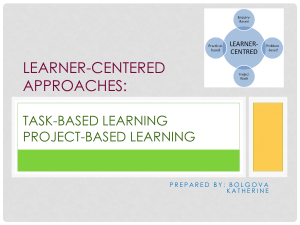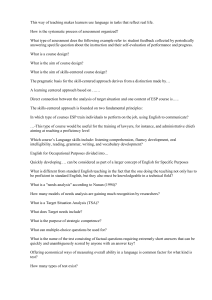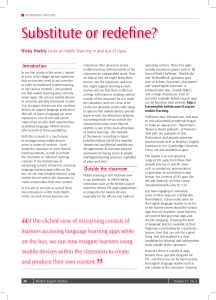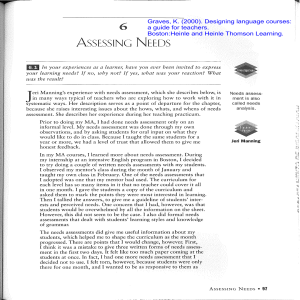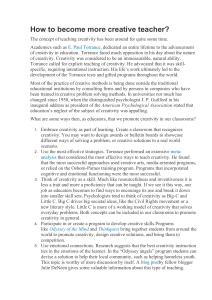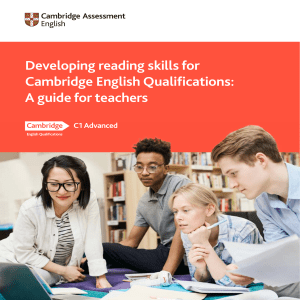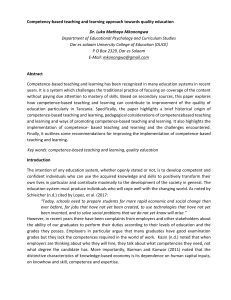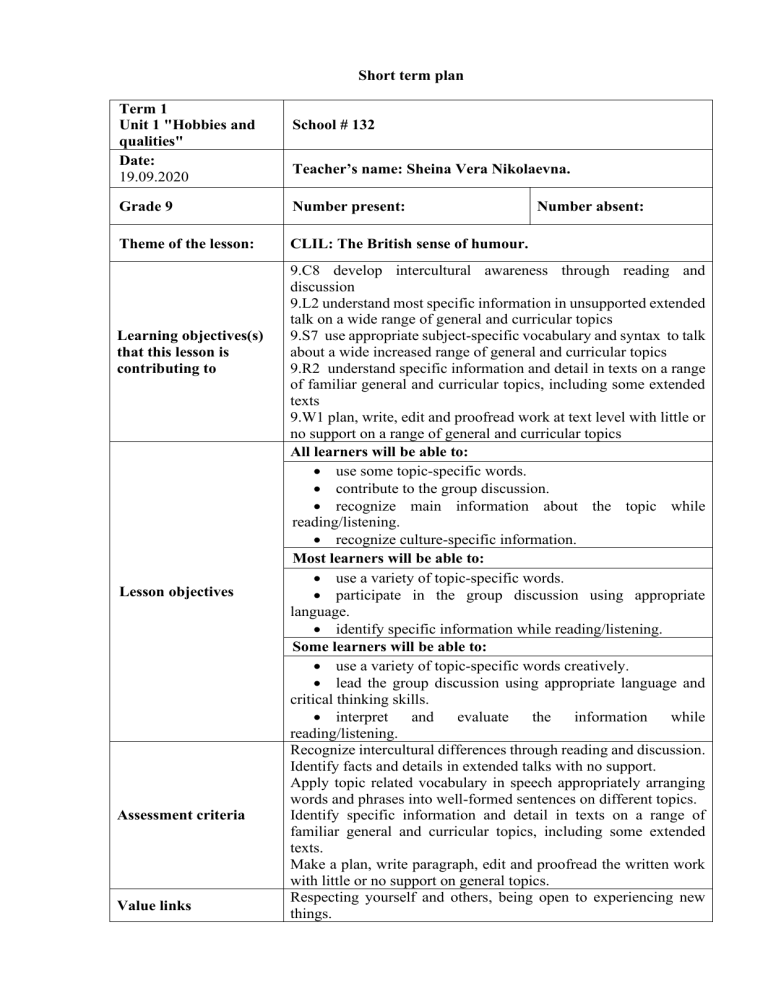
Short term plan Term 1 Unit 1 "Hobbies and qualities" Date: 19.09.2020 School # 132 Teacher’s name: Sheina Vera Nikolaevna. Grade 9 Number present: Theme of the lesson: CLIL: The British sense of humour. Learning objectives(s) that this lesson is contributing to Lesson objectives Assessment criteria Value links Number absent: 9.C8 develop intercultural awareness through reading and discussion 9.L2 understand most specific information in unsupported extended talk on a wide range of general and curricular topics 9.S7 use appropriate subject-specific vocabulary and syntax to talk about a wide increased range of general and curricular topics 9.R2 understand specific information and detail in texts on a range of familiar general and curricular topics, including some extended texts 9.W1 plan, write, edit and proofread work at text level with little or no support on a range of general and curricular topics All learners will be able to: • use some topic-specific words. • contribute to the group discussion. • recognize main information about the topic while reading/listening. • recognize culture-specific information. Most learners will be able to: • use a variety of topic-specific words. • participate in the group discussion using appropriate language. • identify specific information while reading/listening. Some learners will be able to: • use a variety of topic-specific words creatively. • lead the group discussion using appropriate language and critical thinking skills. • interpret and evaluate the information while reading/listening. Recognize intercultural differences through reading and discussion. Identify facts and details in extended talks with no support. Apply topic related vocabulary in speech appropriately arranging words and phrases into well-formed sentences on different topics. Identify specific information and detail in texts on a range of familiar general and curricular topics, including some extended texts. Make a plan, write paragraph, edit and proofread the written work with little or no support on general topics. Respecting yourself and others, being open to experiencing new things. Cross curricular links Use of ICT Health and Safety Social studies. Smart board for showing a presentation, getting additional information, playing the audio, video files. Switch off the active board if you do not use it. If students are tired, do physical exercise with them. Open the window to refresh the air in the classroom during the break. Planned timings Planned activities The lesson greeting. The teacher sets the lesson objectives, letting students know what to anticipate from the lesson. Warm up. Students work in pairs and write in the form of cluster their associations with the word “humour”? (3 min) Stand-up comedy Beginning the lesson fun jokes audience comic series Laughter Joy/ happiness sense of humour Humour entertainment Students read the quotation by Charlie Chaplin “A day without laughter is a day wasted”. Ask students “What does it mean? Do you agree or disagree? Why?” (2 min) Main Activities Discuss with students what humour is and why it is important to have a balance of work/seriousness and fun/pleasure in our lives. (5 min) Descriptor: A learner discusses the questions; uses appropriate topic related vocabulary; explains his/her point of view and supports with arguments. Discussion questions: • Define sense of humour. • Why might it be important to have a sense of humour? • What makes people laugh? • • • • • • • What might some of the benefits of laughing be? How might humour help you challenge negative thinking? Why does humour differ - some people find one thing funny, others don't? Discuss how jokes can be specific to a region, nationality, culture, age group, gender, etc. When are jokes inappropriate? Is laughing really infectious? Why might that be? What makes people laugh? The British are proud of their particular sense of humour and believe that it is unique. British people often say that foreigners, for example the French and Americans, don’t understand British jokes. This fact does reflect some differences in what people in different countries and cultures find funny. It is known that the British have a dry sense of humour. It can be very difficult for outsiders to tell whether or not a person is being funny or serious, so don’t take offence at some remark. To get some information about the British sense of humour students turn to their SB p.17. ex.1. Students play flashcards games to help them remember new words (5 min). https://quizlet.com/528031713/grade-9-unit-1-lesson-9-clil-the-british-sense-ofhumour-flash-cards/ Descriptor: A learner predicts the meaning of new words and matches them with their definitions. Ask students to read the text and complete it with the missing words from the box. Coding text. Students discuss the text with the insert method (10 min). Descriptor: A learner reads the text; completes a graphic organizer white reading the text; answers the questions using information from his/her notes + Knew this fact before − New information ! Was surprised by this fact ? Want to know more Wisdom tree. Students should prepare 3 thick and thin questions according to the content of the text (Who? What? When? Why? What for? What if? Explain?) and then they can ask those questions to each other. Descriptor: A learner asks and answers questions on a given topics Meeting with the hero. Imaging you are to meet Mr. Bean. What would you ask? What, in your opinion, he would answer? Descriptor: A learner makes up questions for the interview; exchanges the opinions. Students work on listening comprehension with short audio TV programme. Then students move on an interactive Kahoot quiz with multiple-choice, content-based listening comprehension questions (10 min). https://create.kahoot.it/details/british-sense-of-humour/1270e538-6c20-4fd8a646-bcbf261d0150 Descriptor: A learner says the main idea of the conversation; chooses the right answer to complete the task 1 How do many foreigners see British people? a) loud b) quiet c) badly behaved 2 Foreigners might find it strange that British people use humour a) in silly situations b) in work situations c) in formal situations 3 Many jokes in English are hard to understand because a) they contain cultural references b) they are political c) they are about history 4 Jokes in English often depend on a) knowledge of grammar b) being difficult for foreigners c) words with double meanings 5 People like Charlie Chaplin and Mr Bean have been successful internationally because a) they have funny expressions b) their humour is visual c) they are famous Ending the lesson Wise owl. Ask students “What conclusion can you make from the lesson which would be important for your future life?” (1 min) Reflections on Humor and Laughter • Humor and laughter are essential to both mental and physical wellbeing. • Humor and laughter boost the spirit of you and others around you. • Finding the fun helps you cope with stress and with life. Giving the home task. (1 min) Read this email from your British friend, Emily. What kind of information does she want you to give her? Why? From: [email protected] Subject: school project Hi there! How are you doing? Haven't heard from you for a long time. Where have you been? Listen, we're doing a project at school about how different teenagers around the world have fun. I'd really like you to help me if you can! So can you tell me: • what kinds of things make you laugh? • what things you do to have a good time? • how often you do them? • how long you've done them for? • why you think having fun is important? If you can think of anything else to write, please do! In return. I'll send you some great photos of me and my friends in London. Thanks very much, and write soon! Emily Write your reply to Emily. Write a paragraph to answer each of her questions. Start like this: To:[email protected] Subject: re: school project Hi Emily Thanks for your email. Sorry I haven't written sooner. I've ... Anyway, you want to know how we have fun here in ... Descriptor: A learner follows the structure of an e-mail; provides content that relevant to the topic; writes with grammar accuracy. Self-assessment (2 min). My participation in the lesson My feelings and emotions during the lesson My difficulties Valuable thoughts for me from the lesson Peer assessment. Name: Activity: Which skill did they use? (reading/writing/speaking/listening) What did they do well? What could they improve? Student giving feedback: Additional information which pair worked well. Differentiation – how do you plan to give Assessment – more support? How do how are you planning to check you plan to challenge learners’ learning? the more able learners? Differentiation can be Observe learners when participating achieved by process in reading, listening, speaking, (Provide textbooks for writing. Did each learner involved visual and word learners. into work? If not, why not? (e.g. Allow auditory learners didn’t understand what to do; not so to listen to audio. Give confident speaking English; not kinesthetic learners the interested in topic; other). opportunity to complete an interactive assignment online.) By support. Less able learners will be supported through sentence frames, glossaries, thinking time. Critical thinking Students think critically, exploring, developing, evaluating and making choices about their own and others’ ideas

